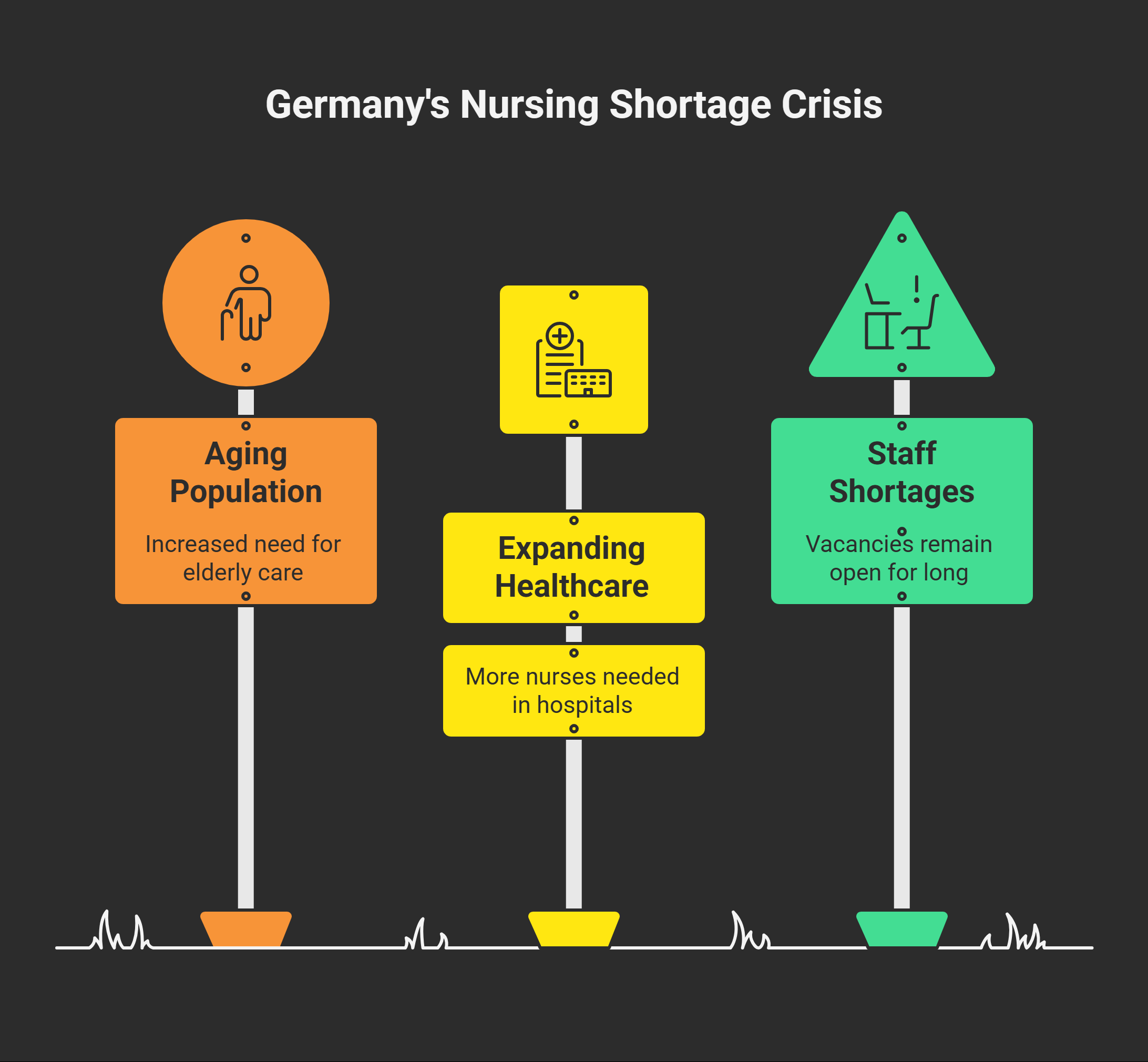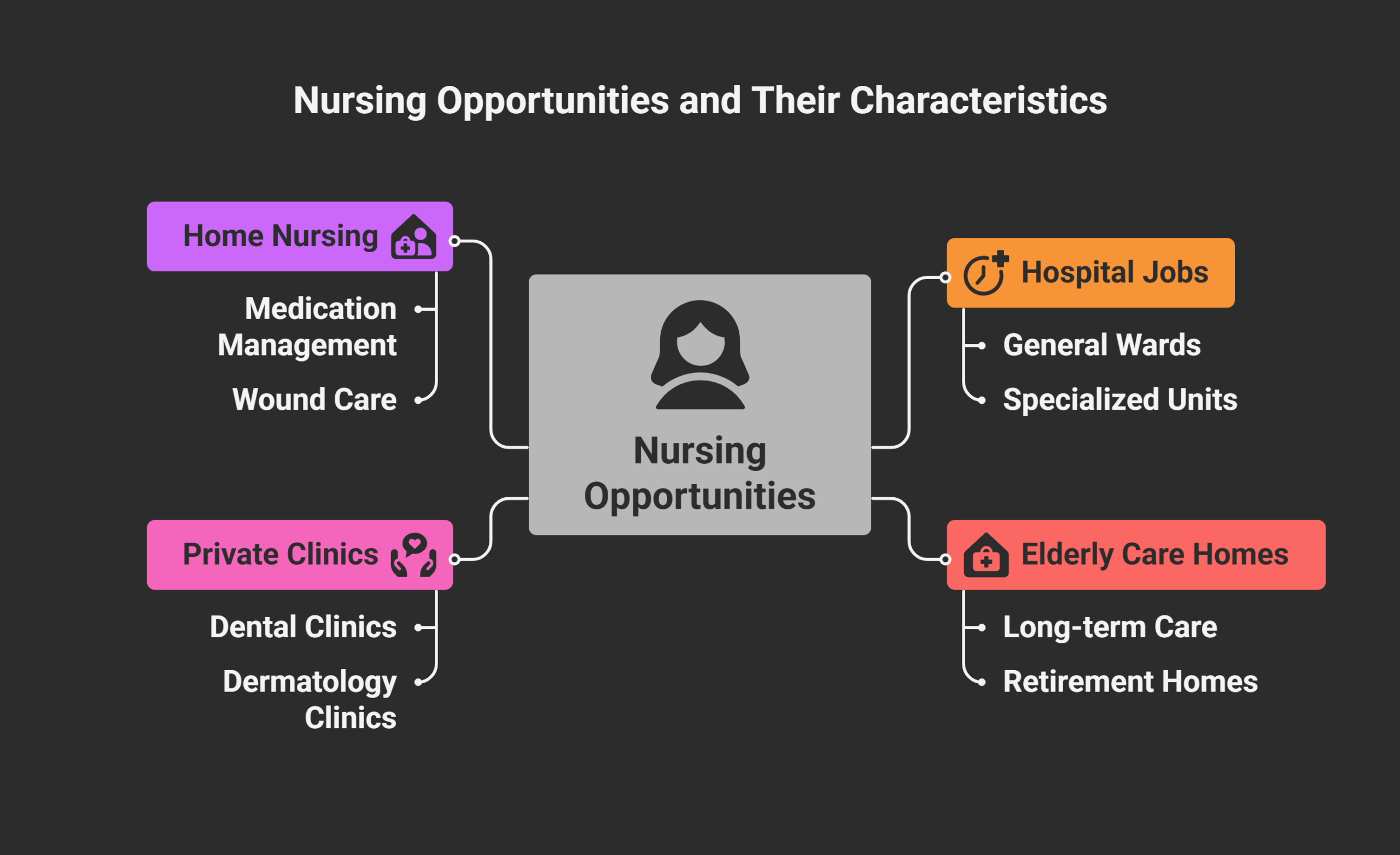Table of Contents
Are you curious about Nursing Opportunities in Germany? This blog gives clear answers for fresh graduates. Germany offers stability, growth, and exciting career paths. Nursing jobs abroad are no longer distant dreams. Here, we explain everything in simple steps. From eligibility to salaries, you’ll learn it all. Stay with us and explore your best options. Your nursing career abroad can start right here.
Starting fresh in a new country feels challenging. But Germany makes it easier for nursing graduates. Opportunities come with guidance, structure, and real career growth. We’ll help you understand requirements step by step. You’ll see how others built their success stories. Reading further can change your career direction. So, let’s dive into the details together.
Quick Highlights
- Germany faces a serious shortage of nurses.
- Fresh graduates are highly valued in the system.
- Average salaries start from €2,500 monthly.
- Work options include hospitals, clinics, and elderly homes.
- German B1/B2 language is usually required.
- Recognition of foreign nursing degrees is essential.
- Trusted portals and agencies simplify the application process.
Master the German Language with Entri App! Click Here for Free Trial Class!
Introduction
Germany is one of the top destinations for nurses today. The country faces a growing demand for qualified healthcare professionals. This demand has created thousands of jobs for fresh graduates. Nursing in Germany offers stability, good pay, and career growth. Graduates find structured work environments with modern healthcare facilities. It is a chance to start a secure career. Many young nurses are now choosing Germany as their path.
Why is Germany attractive for nursing graduates worldwide? The answer is simple: opportunity, growth, and long-term benefits. Graduates can expect high demand and job security. Employers also provide training and language support for newcomers. The healthcare sector respects dedication and fresh talent. Living in Germany also means cultural exposure and experience. Together, these factors make it a rewarding destination.
Key Points:
- Thousands of new nurses are required every year.
- Fresh graduates are hired with training and guidance.
- Salaries are high with strong benefits included.
- Work opportunities exist in hospitals, clinics, and elderly care.
- Language learning support is available for international nurses.
- Career growth is steady with clear development paths.
Brief on Germany’s Demand for Nurses
1: How do you say "Good Morning" in German?
Germany is facing a serious shortage of qualified nurses. The country’s healthcare system is expanding but lacks enough staff. An aging population need constant medical attention. Hospitals, clinics, and elderly homes want more skilled nurses. This shortage provides big opportunities for fresh nursing students. Hence, Germany welcomes international nurses to fill up this gap. The demand is strong and continuously increasing.
Reasons Behind the High Demand
- Aging Population
- Many Germans are above 65 years old.
- Older people require more frequent medical care.
- Elderly care homes are growing quickly.
- Expanding Healthcare System
- Hospitals need more nurses in all departments.
- Clinics face rising patient numbers daily.
- Home care services are also in demand.
- Staff Shortages
- Local graduates cannot meet rising demand.
- Nursing jobs remain vacant for long periods.
- International nurses help close this gap.
Current Statistics
| Factor | Details |
|---|---|
| Nurse shortage estimate | Over 200,000 positions vacant |
| Aging population percentage | 22% above 65 years |
| New nurses needed yearly | Around 50,000+ |
| Vacancy duration | 6–12 months average |
Key Highlights
- Demand is highest in hospitals and elderly care.
- Fresh graduates can find jobs without long delays.
- Employers are ready to train and support newcomers.
- Nursing shortage is a long-term challenge in Germany.
Free German A1 Mock Tests – Powered by AI!
Test your skills on our interactive platform. Get instant feedback from our AI to help you communicate better and track your progress. Start your free German mock test now.
Test Your German A1 for FreeWhy Germany Needs Fresh Nursing Graduates
Germany is in need of young nursing professionals. Fresh graduates have new skills, energy, and adaptability. The healthcare system values their fresh training and updated knowledge. They can quickly adjust to modern methods. Germany views nursing graduates as long-term assets for hospitals. This is why international recruitment strongly targets new graduates.
|
German A2 Exercises – Download Free PDF |
||
Main Reasons Germany Needs Fresh Graduates
- Severe Staff Shortages
- Existing staff cannot cover rising patient numbers.
- Nurse-to-patient ratio is often very high.
- Vacancies remain open for months without applicants.
- International Recruitment Push
- Germany actively invites nurses from abroad.
- Government programs support international hiring.
- Agencies help fresh graduates connect with hospitals.
- Fresh Knowledge and Skills
- Graduates learn latest nursing techniques in training.
- They provide energy and motivation to healthcare work.
- Employers like their eagerness to learn and grow.
Benefits of Hiring Fresh Graduates
- Employers can shape skills through direct training.
- Graduates are open to cultural and system adaptation.
- They ensure a strong future workforce in Germany.
- Nursing shortages reduce with continuous new hiring.
Quick Comparison: Experienced Nurses vs. Fresh Graduates
| Aspect | Experienced Nurses | Fresh Graduates |
|---|---|---|
| Skills | Practical, specialized skills | Updated training skills |
| Flexibility | Less adaptable sometimes | Highly adaptable |
| Cost to train | Higher | Lower |
| Career growth potential | Limited | Long-term development |
Key Points
- Fresh graduates fill urgent staffing gaps.
- They strengthen Germany’s long-term healthcare future.
- Recruitment programs highly favor nursing graduates.
- Opportunities are broad across multiple healthcare sectors.
Eligibility Criteria for Fresh Nursing Graduates
Germany welcomes fresh graduates, but certain rules must be met. These criteria ensure nurses are qualified and ready for patients. Fresh graduates must show proper education, language ability, and recognition. Without meeting these, working as a nurse is not possible. The process is structured to maintain healthcare quality in Germany.
1. Degree Requirements
- A recognized nursing diploma or bachelor’s degree is required.
- The degree must match German nursing education standards.
- Clinical training hours should be included in the course.
- Specialized nursing degrees are accepted after proper evaluation.
2. Language Requirements (German B1/B2)
- German language skills are mandatory for all nurses.
- Level B1 is basic, but B2 is usually required.
- Language proves you can communicate with patients and doctors.
- Many hospitals offer support for further language training.
3. Recognition of Foreign Qualifications
- Foreign degrees must be officially recognized in Germany.
- Recognition ensures your training meets German nursing standards.
- The process is called “Anerkennung” in German law.
- Some nurses may need adaptation training or exams.
Checklist for Eligibility
| Requirement | Needed Level/Detail |
|---|---|
| Nursing qualification | Diploma or Bachelor’s degree |
| Clinical training | Mandatory, with practical hours |
| German language level | B2 (preferred), B1 (acceptable) |
| Recognition of qualifications | “Anerkennung” certificate needed |
Key Highlights
- Degree + language + recognition = basic eligibility.
- Without recognition, work permits are not issued.
- German B2 greatly improves hiring chances.
- Preparation in advance saves time during applications.
Application Process
The application process for nursing jobs in Germany is systematic. They must prepare documents, apply for recognition, and find jobs. Each step requires a proper preparation. Following the steps increases chances of hiring.
Step-by-Step Process
- Prepare CV and Documents
- Create a detailed CV in German format.
- Provide education, training, and clinical practice details.
- Have transcripts, certificates, and recommendation letters.
- Recognition of Qualifications (Anerkennung)
- Submit nursing degree for official recognition.
- German authorities check if qualifications match their standards.
- Extra training or exams may be required.
- Apply for Licensing
- A professional license (“Berufserlaubnis”) is mandatory.
- Apply after recognition of qualifications is completed.
- License allows legal work as a nurse in Germany.
- Job Applications
- Apply through hospital portals and care centers.
- Trusted recruitment agencies also assist graduates.
- Highlight language certificates and soft skills.
- Visa and Work Permit
- Secure an employment contract from an employer.
- Apply for work visa with contract and license.
- Attend embassy interviews and provide required documents.
Key Portals and Agencies
- Make it in Germany (official government portal).
- EURES (European job mobility portal).
- Trusted nursing recruitment agencies across Asia and Europe.
- Hospital career pages directly listing nursing vacancies.
Flow Table of the Process
| Step | Action Required |
|---|---|
| Step 1: CV & Docs | Prepare German CV + certificates |
| Step 2: Recognition | Submit qualifications for “Anerkennung” |
| Step 3: Licensing | Apply for “Berufserlaubnis” |
| Step 4: Job Applications | Use portals, agencies, hospital websites |
| Step 5: Visa & Work Permit | Apply with job contract + license |
Key Highlights
- Recognition is the most important step in the process.
- German CV format increases chances of job selection.
- Trusted agencies can simplify paperwork for fresh graduates.
- A confirmed contract is required for visa approval.
Master the German Language with Entri App! Click Here for Free Trial Class!
Free German A1 Mock Tests – Powered by AI!
Test your skills on our interactive platform. Get instant feedback from our AI to help you communicate better and track your progress. Start your free German mock test now.
Test Your German A1 for FreeTypes of Nursing Opportunities Available
Fresh nursing graduates in Germany can choose several paths. Healthcare institutions provide roles based on skills and interests. Graduates start from hospitals, clinics, elderly care, or homes. Every role provides stable income and valuable career experience. Choosing a certain path depends on personal goals and strengths.
1. Hospital Jobs
- They work in general wards or specialized units.
- Duties are: patient care, monitoring, and treatment support.
- Hospitals provide training for fresh graduates.
- Example: Surgery wards, emergency care, maternity, or pediatrics.
2. Elderly Care Homes
- Elderly care is in very high demand.
- They assist seniors with daily medical and personal needs.
- Emotional support and patience are needed here.
- Example: Long-term care or retirement homes.
3. Private Clinics
- Clinics focus on outpatient treatments and quick services.
- Nurses assist in minor procedures and patient counseling.
- Work schedules are more regular than hospitals.
- Example: Dental, dermatology, or physiotherapy clinics.
4. Home Nursing
- Nurses provide medical care directly at patients’ homes.
- Duties include medication, wound care, and health monitoring.
- Flexible schedules but strong independence is required.
- Example: Long-term patients needing personal care at home.
Comparison of Opportunities
| Type | Main Duties | Demand Level | Work Style |
|---|---|---|---|
| Hospital Nursing | Patient care, treatments | Very High | Fast-paced |
| Elderly Care Homes | Daily care for seniors | Extremely High | Steady, emotional |
| Private Clinics | Outpatient treatment support | Medium | Regular schedule |
| Home Nursing | Personal home-based care | High | Independent work |
Key Highlights
- Hospitals offer career growth and specialization chances.
- Elderly care homes are most in demand nationwide.
- Clinics provide stable hours with less night duty.
- Home nursing gives flexibility and personal patient contact.
Salary & Benefits for Fresh Nursing Graduates in Germany
Germany offers attractive salaries for nursing graduates starting their careers. The pay scale depends on experience, workplace, and region. Fresh graduates usually earn enough to live comfortably in Germany. In addition, benefits and allowances make nursing even more rewarding. These packages ensure nurses feel valued and motivated at work.
Average Salary Range
- Starting salary: €2,500–€3,200 per month.
- Salary may increase after probation period or training.
- Overtime, weekend, and night shifts bring extra pay.
- Specialized wards may offer higher monthly income.
Benefits Offered to Fresh Nurses
- Allowances
- Night shift and weekend work bring extra payments.
- Overtime hours are fairly compensated.
- Social Security
- Nurses are covered by German social security schemes.
- Includes pension, unemployment, and health insurance.
- Healthcare Coverage
- Nurses receive comprehensive health insurance.
- Family members can also be included.
- Career Growth
- Specialization courses are often sponsored by employers.
- Promotions lead to higher salaries over time.
Salary Comparison by Workplace
| Workplace | Average Salary (per month) | Notes |
|---|---|---|
| Hospitals | €2,800–€3,200 | Higher overtime opportunities |
| Elderly Care Homes | €2,500–€2,900 | Strong demand, stable work |
| Private Clinics | €2,600–€3,000 | Regular schedules, fewer shifts |
| Home Nursing | €2,500–€2,800 | Flexible hours, independent work |
Key Highlights
- Fresh nurses earn competitive starting salaries in Germany.
- Benefits include overtime, insurance, and social security.
- Career growth ensures steady salary increases over time.
- Elderly care and hospitals offer the most opportunities.
Challenges for Fresh Nursing Graduates
Working in Germany as a fresh nursing graduate is rewarding. However, it also comes with some real challenges. Understanding these challenges helps in better preparation before applying. Most issues are temporary and can be solved with effort.
1. Language Barrier
- German is required for communication with patients and doctors.
- Medical terms are often difficult for new graduates.
- Miscommunication can cause stress and reduce confidence.
- Continuous language practice improves fluency over time.
2. Cultural Adjustment
- German work culture is structured and very punctual.
- Nursing styles may differ from your home country.
- Social customs and lifestyle changes may feel challenging.
- Adapting takes time but brings personal growth.
3. Licensing Delays
- Recognition of foreign qualifications can take many months.
- Missing documents may cause longer waiting times.
- Without a license, work cannot officially start.
- Planning early helps reduce waiting periods.
4. Work Pressure
- Hospitals and care homes are often understaffed.
- Fresh graduates may face heavy workloads at times.
- Shift duties include nights, weekends, and overtime.
- Good teamwork helps in handling workload smoothly.
Possible Solutions
| Challenge | Suggested Solution |
|---|---|
| Language Barrier | Start B1/B2 German early, practice daily |
| Cultural Adjustment | Learn local customs, join support groups |
| Licensing Delays | Apply early, use trusted agencies |
| Work Pressure | Build teamwork, seek mentorship |
Key Highlights
- Language and licensing are the biggest initial challenges.
- Cultural differences can be overcome with openness.
- Workload is heavy but manageable with teamwork.
- Preparation reduces stress and makes transition smoother.
|
Goethe 2025 Exam Dates: Multiple Test Centers |
|
| Trivandrum Goethe Exam Dates | Kochi Goethe Exam Dates |
| Chennai Goethe Exam Dates | Coimbatore Goethe Exam Dates |
Tips to Increase Chances of Getting Hired
Fresh graduates can improve their job prospects with preparation. Employers in Germany value skills, language, and professional attitude. Small steps taken early can make a big difference. Here are proven tips to boost your chances.
1. Learn German Early
- Start learning German before applying for jobs.
- Aim for B2 level for better job opportunities.
- Daily practice builds confidence in real conversations.
- Example: Join online courses or language apps.
2. Apply via Trusted Agencies
- Use only certified or government-approved recruiters.
- Trusted agencies guide you through paperwork and recognition.
- They connect candidates directly with German hospitals.
- Example: “Make it in Germany” portal.
3. Highlight Soft Skills
- Employers value empathy, teamwork, and communication skills.
- Mention these clearly in your CV and interviews.
- Example: Share experiences of patient care during training.
- Show readiness to work in diverse environments.
4. Prepare a Professional CV
- Use the German CV format for applications.
- Include education, training, and certifications clearly.
- Add language certificates and clinical practice details.
- Keep the CV concise, accurate, and professional.
5. Show Adaptability
- Employers prefer candidates willing to adapt quickly.
- Be open to working in different healthcare settings.
- Example: Hospitals, elderly care, or clinics.
- Flexibility increases job placement chances.
Quick Checklist
| Step | Action to Take |
|---|---|
| Language Skills | Reach B2 level in German |
| Agency Choice | Use only trusted recruiters |
| Soft Skills | Highlight empathy, patience, teamwork |
| CV Preparation | Follow German CV format |
| Flexibility | Accept diverse roles and shifts |
Key Highlights
- Strong German skills make candidates stand out.
- Trusted agencies reduce risks and delays.
- Soft skills are equally important as technical skills.
- Flexibility ensures faster hiring and better opportunities.
Conclusions:
Germany offers significant opportunities for fresh nursing graduates. The country faces a growing shortage of healthcare professionals. Hospitals, clinics, elderly care homes, and home nursing need staff. Fresh graduates can benefit from structured training and clear pathways. Learning German and completing licensing ensures eligibility for better roles. Competitive salaries, benefits, and career growth make Germany attractive. Prepared candidates can secure rewarding jobs in a supportive system.
Early preparation and understanding application processes increase success chances. Following eligibility criteria and using trusted portals simplifies the journey. Soft skills like empathy and teamwork strengthen hiring prospects. Overcoming language and cultural challenges ensures smoother professional integration. Germany’s healthcare sector offers long-term stability and growth opportunities. Fresh nursing graduates can take advantage of these growing opportunities.
| German Language Courses | |
| German Language A1 Course Online Coaching | German Language A2 Course |
| German Language B1 Course online Coaching | German Language B2 Course Online Coaching |
Related Links
Free German A1 Mock Tests – Powered by AI!
Test your skills on our interactive platform. Get instant feedback from our AI to help you communicate better and track your progress. Start your free German mock test now.
Test Your German A1 for FreeFrequently Asked Questions
What makes Germany an attractive destination for fresh nursing graduates?
Germany is highly attractive due to its strong healthcare system, competitive salaries, and structured career growth opportunities. The country faces a shortage of trained nurses, which creates high demand for fresh graduates. Hospitals, elderly care homes, clinics, and home nursing sectors actively recruit international nurses. Additionally, Germany offers long-term stability, modern facilities, and exposure to advanced medical practices. Learning German opens doors to higher positions and better patient interaction, making it ideal for professional development.
Why is there a shortage of nurses in Germany?
Germany’s population is ageing rapidly, increasing demand for healthcare services. Many existing nurses are retiring, leading to staffing gaps in hospitals and care facilities. The country also experiences high workload and burnout among healthcare staff, causing further shortages. Rural areas and specialized departments often struggle to find qualified personnel. As a result, Germany actively encourages international recruitment to meet the rising demand efficiently.
What are the eligibility requirements for fresh nursing graduates to work in Germany?
Candidates must have a recognized nursing degree from their home country. German language proficiency is mandatory, typically at B1 or B2 level, depending on the employer. Foreign qualifications need official recognition through the German nursing licensing authority. Basic knowledge of healthcare practices and patient care standards is expected. Some institutions may require prior clinical experience, although fresh graduates are often welcomed.
How can foreign nursing qualifications be recognized in Germany?
Applicants must submit diplomas, transcripts, and certificates to the local recognition authority (Anerkennungsstelle). Proof of practical experience may be required, especially for specialized nursing roles. A competency assessment or adaptation period might be necessary if training standards differ. Once approved, candidates receive the official nursing license to work legally. This recognition ensures compliance with German healthcare regulations.
What is the step-by-step application process for fresh nursing graduates?
First, prepare a detailed CV highlighting education, skills, and clinical experience. Collect academic transcripts, degree certificates, language proficiency proof, and identity documents. Submit applications to hospitals, care homes, or licensed recruitment agencies. Obtain recognition of qualifications through the local licensing authority. Attend interviews, skill assessments, and licensing exams if required. Secure a job offer and apply for a work visa or EU permit.
Which types of nursing opportunities are available for fresh graduates?
Hospital nursing positions include general wards, emergency, ICU, and specialized units. Elderly care homes provide long-term care and rehabilitation support roles. Private clinics offer outpatient care and specialized services such as pediatrics or maternity. Home nursing allows nurses to provide personalized care for patients in their residences. Each type of opportunity may have different schedules, salary scales, and career growth paths.
What is the average salary for fresh nursing graduates in Germany?
Entry-level nurses typically earn between €2,500 and €3,200 per month. Salaries may increase with additional experience, certifications, or specialization. Overtime pay, allowances, and shift differentials can further enhance earnings. Benefits often include health insurance, paid leave, pension contributions, and professional development support. Career advancement can lead to senior nurse, ward manager, or specialized roles with higher compensation.
What challenges might fresh graduates face when moving to Germany?
Language barrier can be a significant challenge in patient care and daily life. Cultural adjustment includes understanding workplace norms, communication styles, and local customs. Licensing and qualification recognition may take time, delaying employment. Relocating may involve logistical challenges like housing, transportation, and family adjustments. Adaptability, resilience, and proactive learning help overcome these challenges effectively.
How can fresh graduates increase their chances of getting hired in Germany?
Start learning German early to meet language requirements and boost confidence. Apply through trusted recruitment agencies and official hospital portals for verified job opportunities. Highlight soft skills such as empathy, teamwork, and communication in applications. Prepare for interviews and practical assessments by practicing common scenarios. Continuous professional development, networking, and staying updated with healthcare trends also improve employability.
Are there long-term career growth opportunities for nurses in Germany?
Yes, Germany offers structured career progression from entry-level to senior nursing roles. Specializations such as ICU, geriatrics, or pediatric care provide higher responsibility and salary. Nurses can pursue further studies, certifications, or management positions. Opportunities exist in hospitals, private clinics, research, teaching, and administrative roles. Continuous skill enhancement ensures job stability, growth, and professional recognition in the healthcare sector.














